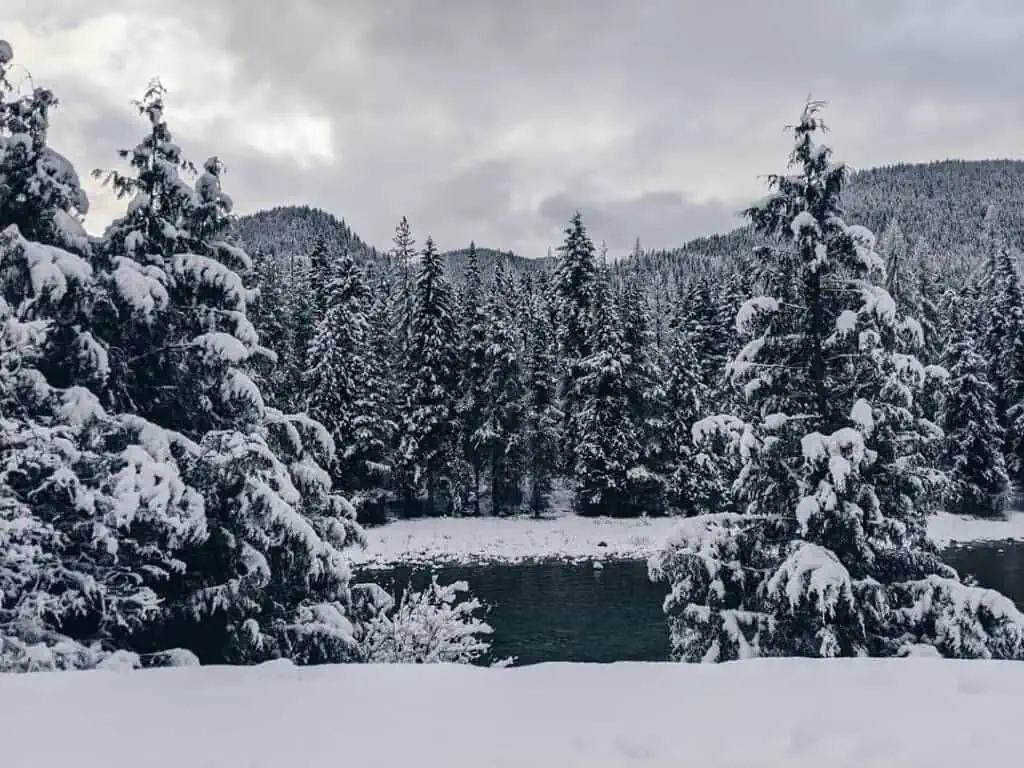
Snow blankets the landscape in Hamilton, Montana. Courtesy of Big Creek Coffee Roasters.
While the sun is finally peeking through the clouds in our home base of Berkeley, California, much of the U.S. is still blanketed in snow. If you’re trying to dig out of your driveway to go to work, that’s a bummer, but if you’re getting ready to hit the slopes, you’re in your happy place. Either way, you’re going to need coffee, and we’ve found 10 ski country coffees to recommend you get your gloved hands on. Why drink the generic brew that’s served at most ski lodges? You deserve better. These thoughtful roasters from popular ski areas in Vermont, Colorado, Wyoming, Oregon, Montana, Utah and California have got you covered.
We sampled a range of coffee types, from unique house blends to classic single origins. Perhaps not surprisingly, the single origins rose to the top of our score tally. The 10 we review here include one blend and nine single-origin coffees — one from Panama, three Kenyas, three Ethiopias, an El Salvador and a Tanzania. We spoke with the roasters to find out why they chose these coffees, what their roasting philosophies are, and what their local communities appreciate in a winter coffee menu.
Panama Geisha at the Top
Our highest-scoring coffee was a Panama Finca Las Nubes Geisha from Vermont Artisan Coffee & Tea Co., whose balanced, delicate, berry-driven profile landed it at 94. And it’s a bargain for a coffee produced exclusively from the Geisha variety at $15.00/8 ounces. Holly Alves, “marketing maven and chief of stuff” at Vermont Artisan, says, “Our philosophy of roasting is to always be on the lookout for high-quality green beans that have characteristics unique to their particular origin, then roast them in small batches to highlight their best qualities.” This statement echoes the values of small roasters everywhere who are trying to elevate the craft of coffee through thoughtful sourcing and meticulous roasting.
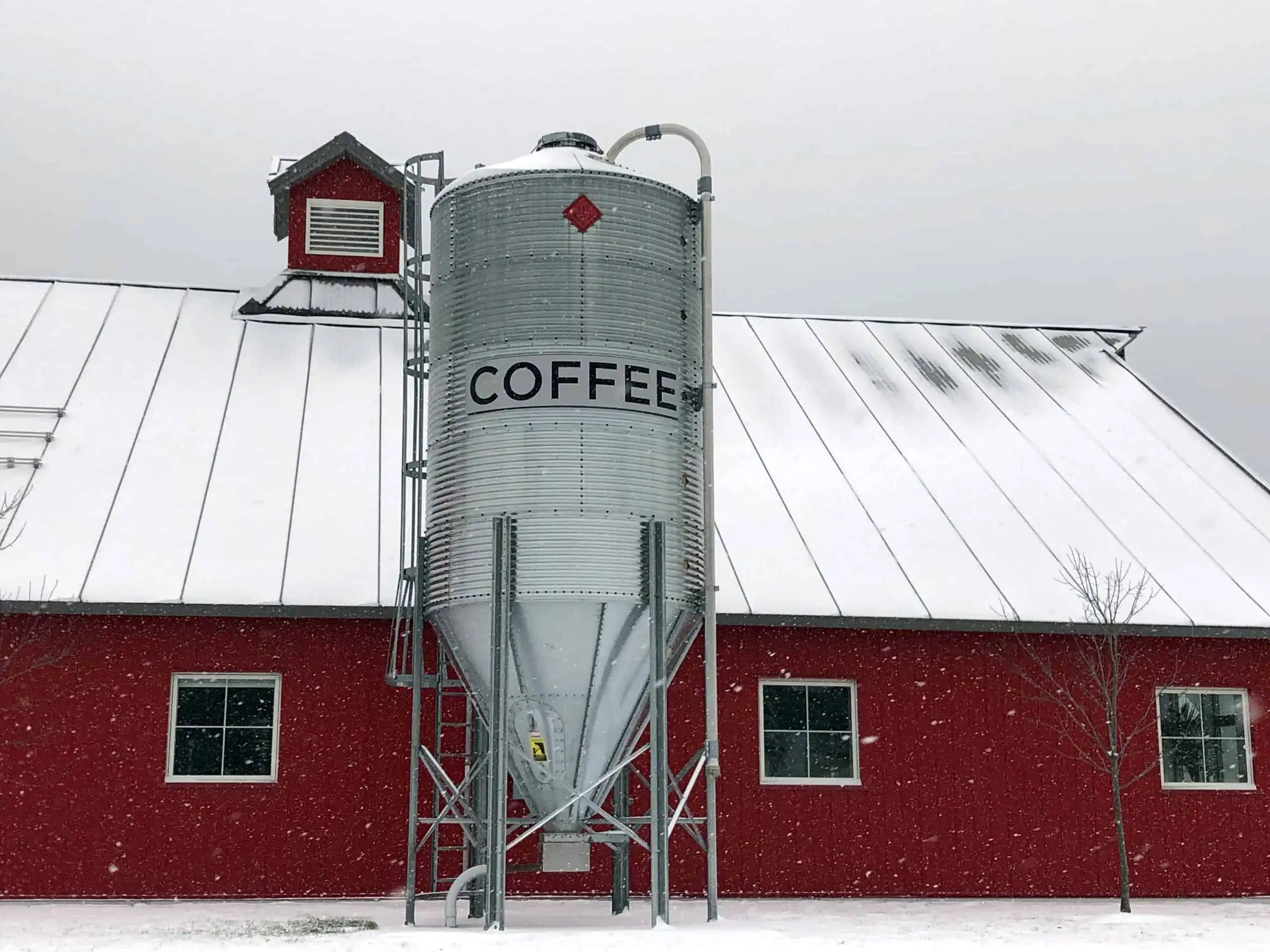
Vermont Artisan Roastery in Waterbury Center is a winter oasis for coffee lovers. Courtesy of Vermont Artisan.
As for winter-specific offerings, Vermont Artisan makes an exclusive Alpine Blend for The Lodge at Spruce Peak at Stowe Mountain Resort. While Alves says that Vermont Artisan’s Kenya, Moka Java and Artisan Dark Blend are the company’s three most popular coffees, regular customers and baristas alike are always excited about special coffees, like this Geisha, that differ from the everyday choices.
Three Approaches to Kenya
Kenya’s classic coffees work well for a range of roast profiles, and our blind cupping coincidentally turned up three coffees that express different faces of Kenya, from bright and juicy to cocoa-toned and spice-driven.
Eagle, Colorado-based Color Coffee’s Kenya Gaturiri AA (93) is brightly sweet-savory with a complex bittersweet structure and juicy acidity. Founder Charlie Gundlach says, “Our philosophy of roasting is always to achieve maximum juiciness, sweetness and flavor clarity. We roast light, no doubt, but also steer away from sour and vegetal flavors. Our roasting is calculated, precise and consistent.” He adds, “Our customers like how we tame Kenya acidity without introducing roast flavors.”
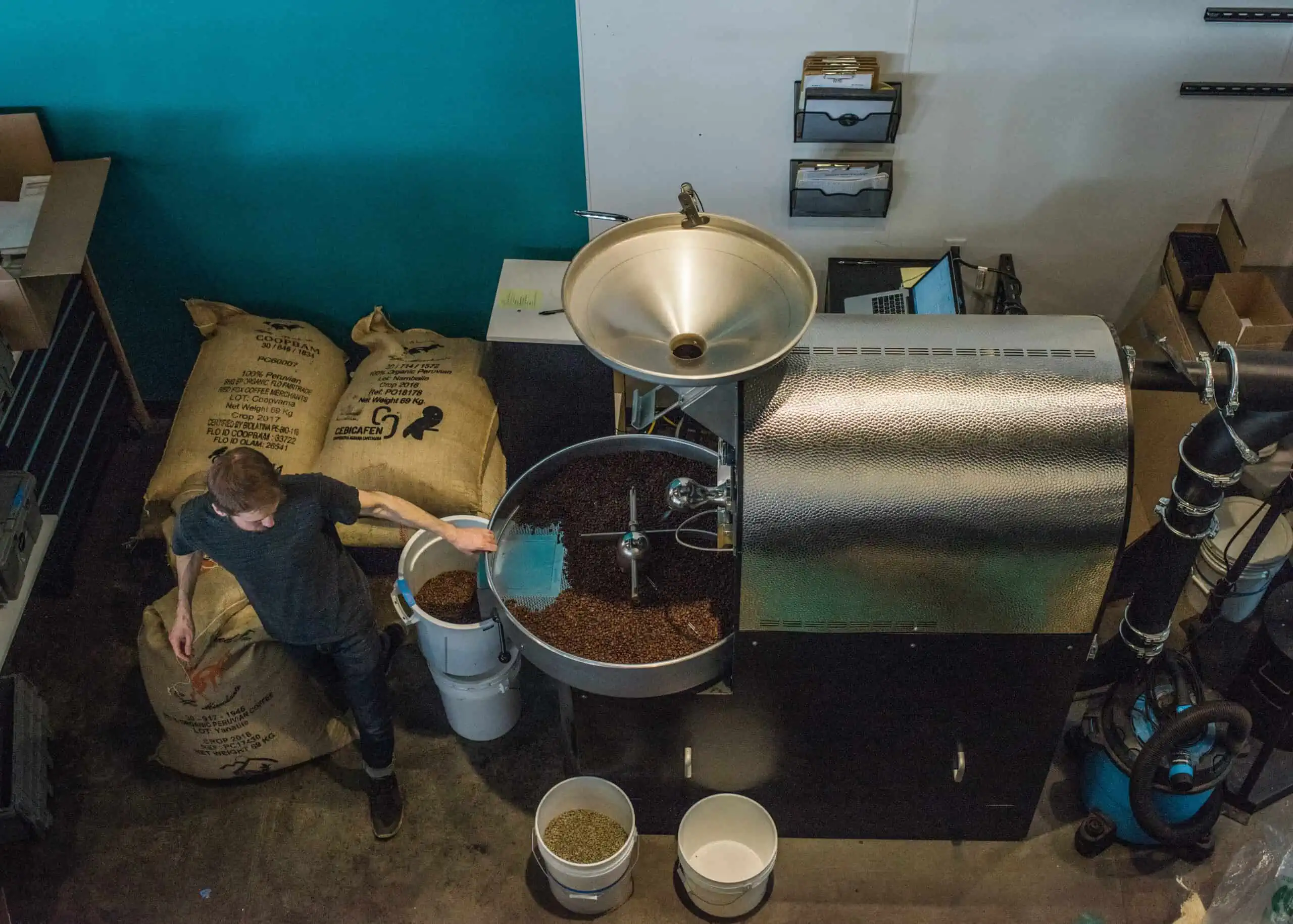
A bird’s eye view of the roastery at Color Coffee in Eagle, Colorado. Courtesy of Color Coffee.
Durango Coffee’s Kenya Karinga AA (93) presents familiar notes we’ve come to associate with the origin, in particular black currant and cocoa nib. Owner-roaster Carl Rand’s philosophy is “to retain the character of the variety and land on a balanced coffee with optimal sweetness,” which he’s achieved beautifully here. The Durango, Colorado-based company doesn’t have a special winter menu; this Kenya was imported by Covoya, but Rand says that Durango’s most-popular coffees, year-round, are direct-trade offerings from Costa Rica (Las Lajas), Guatemala (El Retiro and La Merced), and Colombia (Bayter brothers), all farms he’s worked with for many years.
Ashland, Oregon-based Noble Coffee Roasting submitted a Kenya Muiri Estate Peaberry (92), which founder and CEO Jared Rennie says is challenging to profile because of the thermodynamics of roasting a spherical coffee bean. For him, the goal is “to bring out the fullness of the origin’s character — the terroir — by roasting the coffees quite lightly, but enough that we are allowing the essence of each coffee to be developed.” He adds, “The Muiri Estate happens to be an excellent coffee for ski season with its potpourri-esque character.” We also found the cup to be warmly spice-toned, with notes of ginger blossom and orange zest. As a bonus, Noble exclusively sources USDA organic-certified coffees.
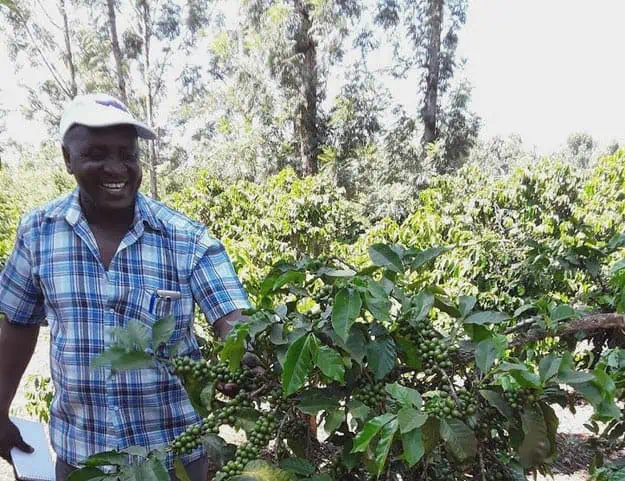
Tending to coffee trees at Muiri Estate in Kiambu County, Kenya. Courtesy of Noble Coffee.
Ethiopia is Always In Season
While The Nomadic Bean (Jackson Hole, Wyoming), Breck Coffee (Breckenridge, Colorado) and Drink Coffee Do Stuff (Truckee, California) are all situated in the heart of popular ski territories that see a lot of visitor traffic, they also each have a strong local following among year-round residents. So, in addition to inexpensive blends whose catchy names appeal to seasonal visitors seeking snow, they stock single-origin coffees that are staples for locals and coffee-obsessed tourists. We review here an Ethiopia from each roaster (ranging in score from 91–93), and it’s probably not a coincidence that all three are natural-processed. Though this is a small sample size, the prevalence of Ethiopia naturals in our report cupping is evidence to support the notion that coffee styles associated with specialty coffee’s third wave have reached far beyond urban centers into small towns where coffee is taking on more value and nuance.
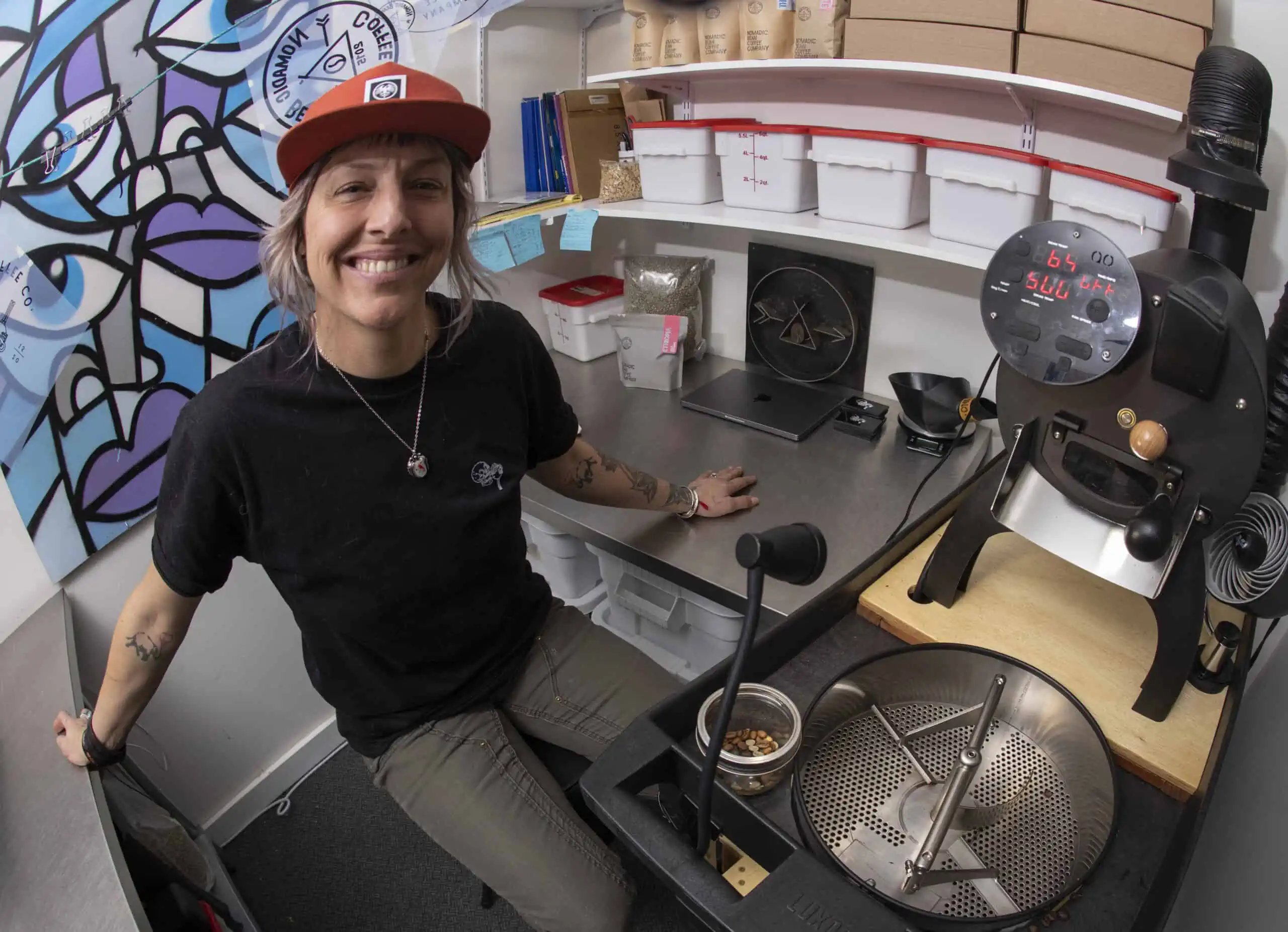
Margo Askins roasts coffee at The Nomadic Bean, her one-woman show in Jackson Hole, Wyoming. Courtesy of The Nomadic Bean.
The Nomadic Bean is Margo Askins’ one-woman show. Her Ethiopia Guji Odo Shakiso (93) is a delicately fruit-forward coffee with notes of just-picked blueberry, honeycomb and crisp chocolate. Askins says she chose this coffee for its sweet fruit and heavy body, and she reports that her customers like that it’s “very drinkable, mild-mannered, fruity but not bitter or overly acidic.” She always has a natural-processed Ethiopia on the menu, and she has seen customers who are longtime dark-roast devotees opening up to this particular coffee — a win for her roasting style, which tends toward lighter profiles. She spends a lot of time helping customers learn to optimize their at-home brewing for different roast profiles. She says, “What I’ve found with many customers is that a bit of how-to education, whether about grind size or water temperature, really changes their sense of characteristics in the cup, and once they get a coffee dialed in, they come back for more.”
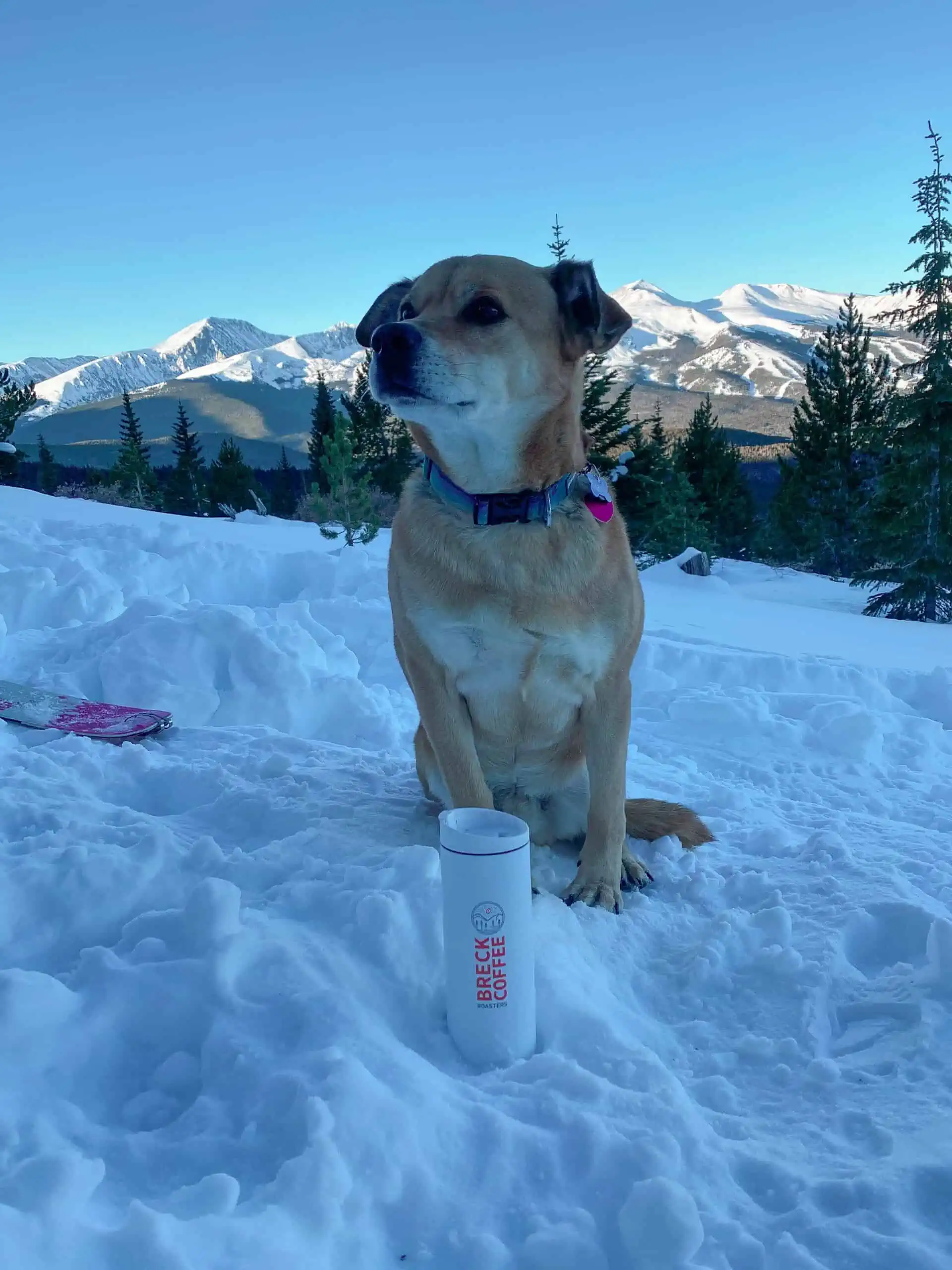
One of Breck Coffee Roasters’ unofficial brand ambassadors. Courtesy of Kia Grant.
Breck Coffee’s Ethiopia Guji Kercha G2 (92) is a cleanly sweet-tart natural that gets ballast from crisp cocoa and sweet herb notes. Founding partner Alex Bremer says, “We were very impressed with how balanced and complex this coffee was from the first time we cupped it. Its fruit notes, relatively low acidity and beautiful body make it a perfect choice for the light-roast natural-coffee drinker. He adds, “Obviously, living in one of the biggest ski destinations in the world, we see our biggest crowds in the winter, the majority of whom have one goal in mind: Get on the mountain and ski! That said, we love having a quick, affordable coffee to fuel these folks up before a long day on the hill. Typically, during the busy season, we gravitate toward medium- or dark-roasted washed coffees that will satisfy the majority of our clientele while still offering at least one natural, as well as a microlot or anaerobic coffee, just in case somebody has a hankering for a more complex cup.”
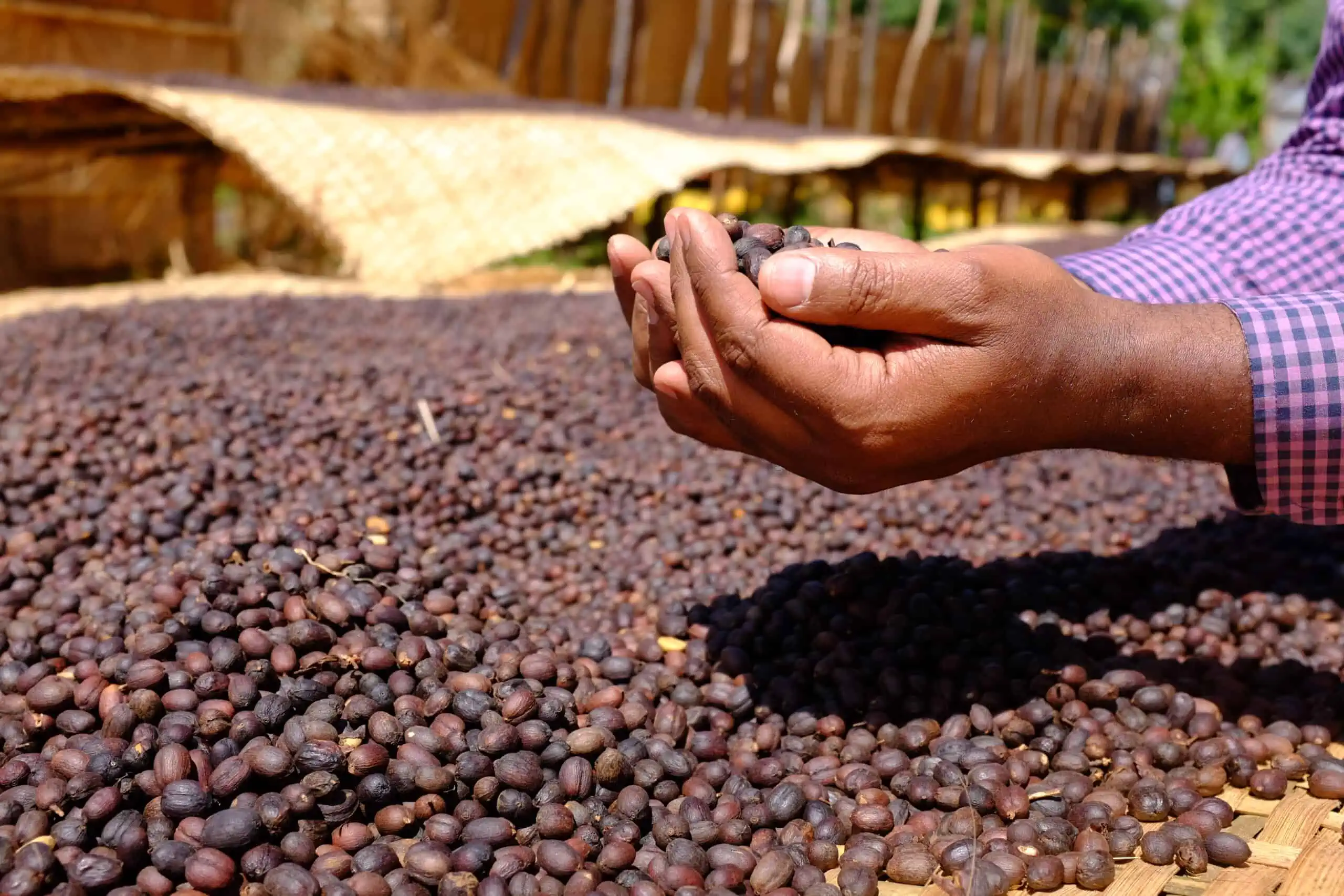
Checking on coffee drying on raised beds in Ethiopia’s Guji Zone in the southern part of the country. Courtesy of Drink Coffee Do Stuff.
The founder of Truckee, California-based Drink Coffee Do Stuff, Nick Visconti, says, “Roasting and brewing coffee in Lake Tahoe comes with unique challenges and opportunities, one of which is tourism and traffic swings that bring outdoor adventurers and coffee lovers from across the country. Our menu changes just as the vibe changes seasonally. While our main blends are available year-round, our single origins rotate in and out with summer skies and winter snowpack. Typically, we find ourselves sourcing and serving coffees that are sweet and comforting in the winter, light and bright in the summer.” He says his customers love the Ethiopia Dur Feres (91) for its “amazing sweetness coupled with approachable fruit overtones and an entry-level price point for its origin.” For the record, the company’s perennial bestsellers are the aptly named blends Hell Yeah!, Bark at the Moon, and Tips Up Tahoe, all dark-roast blends.
Two Classic Washed Coffees and a “Gateway” Blend
Two solid samples from roasters new to Coffee Review are the Backporch El Salvador Las Delicias Pacamara (92) and the Pink Elephant Tanzania (92). The Backporch El Salvador comes to us from Bend, Oregon, and is a bold, rich-toned cup with tart fruit and spice undertones. Founder Dave Beach says he’s worked with the producers, the Menendez family, for over a decade, and that customers love this coffee’s woodsy, nutty, citrusy notes. He says, “We typically add more coffees to our menu during the winter season, mainly due to the holidays, which is when we roast and sell our nicest microlots and more expensive coffees that are popular for gift giving.”
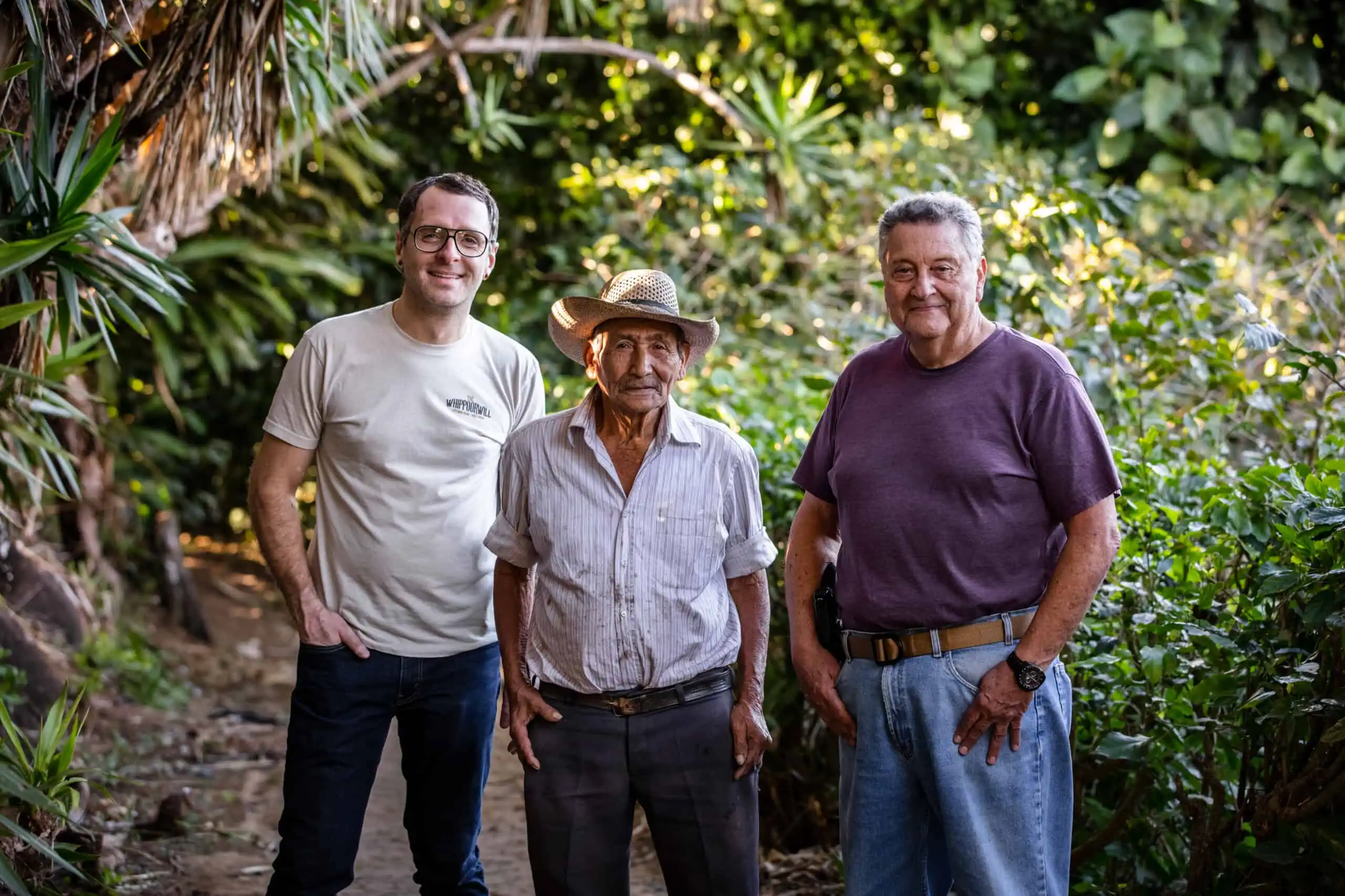
Backporch Coffee founder Dave Beach at El Salvador’s Finca Las Delicias with farmer Rene Monroy and owner-operator Miguel Menendez, Sr. Courtesy of Backporch.
Pink Elephant’s Tanzania is floral and chocolaty, with an intensity that co-owners Mitch and Kelley Baker attribute to this Tanzania’s peaberry grade. Their roastery in Heber City, Utah, and coffee shop in Park City attract a mix of tourists and locals, and the Bakers maintain their focus on high-quality single origins and blends that are both remarkable and approachable. While their café menu remains relatively consistent year-round, they like to offer winter specials with homemade syrups, such as a peppermint mocha made with local dark chocolate.
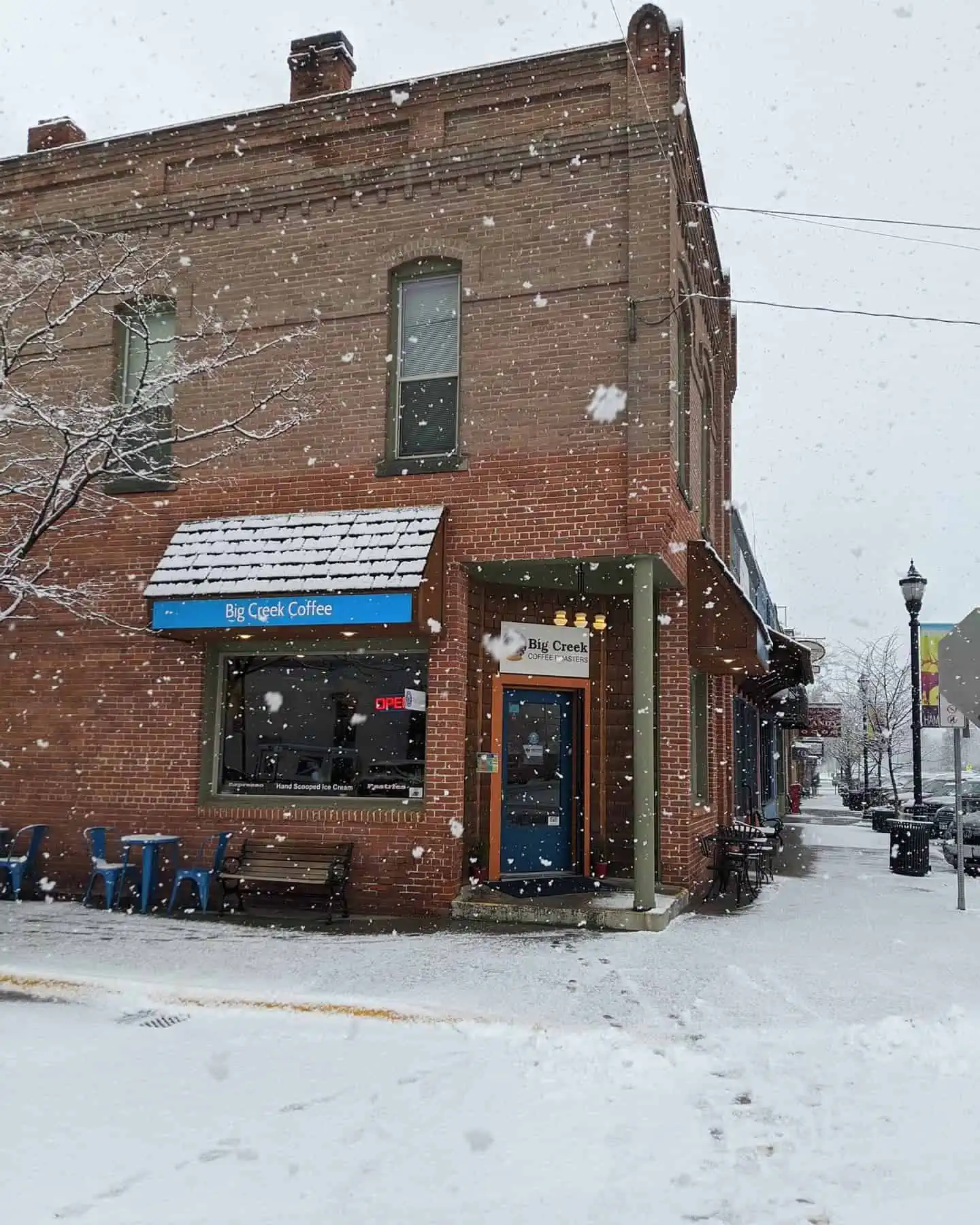
Big Creek Coffee in Hamilton, Montana is an easy stop on the way to Lost Trail Powder Mountain, a popular skiing destination. Courtesy of Randy Lint.
The one blend on our list is Big Creek Coffee Roasters’ Glow Seasonal Reserve Blend (92), which owner-roaster Randy Lint calls a “gateway” coffee. While the bulk of Big Creek’s sales are medium and dark roasts, Lint says, “We consider this seasonal light roast a ‘gateway’ coffee because we’re introducing customers to the new flavors of a well-developed lighter roast at a time of the year when they are more willing to take a chance and step outside their typical comfort zones.” It’s a rotating blend of two organic-certified Ethiopia coffees, one washed (Ethiopia Gedeb Halo Beriti) and one natural-processed (Ethiopia Kayon Mountain). Big Creek, in Hamilton, Montana, is conveniently located on the way to the local ski area, Lost Trail Powder Mountain in Sula, Montana. Lint reports that visitors hitting the slopes tend toward heavier drinks in the long winter months, like Americanos, breves, and maple brown butter lattes. But he adds, “Glow allows our customers to explore [the often surprising character of] natural-process coffees without hitting them over the head from the outset.”
Ski Country Takeaways
The 10 coffees we review this month, ranging in score from 91–94, are all examples of the excellent work small specialty roasters are doing in their communities. We were especially impressed with their care and attention to both sourcing and roasting. Given the influx of winter tourists from around globe to these popular ski destinations, it’s no surprise these roasters seek to balance their menus by offering lower-priced, approachable coffees alongside higher-end, more nuanced selections to appeal to a wide range of palates and preferences. This should be welcome news for our readers heading to the slopes this winter, and a call to support these innovative local roasters when you visit.

